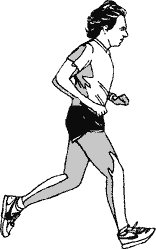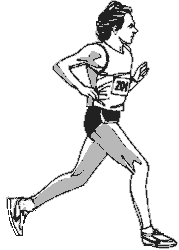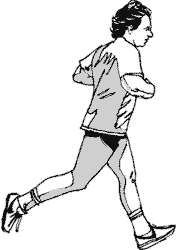Rarely does a jogger have a plan or goal. Most run as a healthy diversion and don’t feel the need to get anything more out of it. They just get out there when they can and do what they can. Those who do feel they need a plan often think they don’t know enough to prepare one. They may pick up a few tips from a more experienced running friend or — ideas from a running magazine. Unfortunately this often ends in frustration or injury because such plans are not based upon the jogger’s own individual abilities and goals, but upon someone else’s. At first you probably needed a group or at least another person for motivation and direction. As a jogger you are a bit more independent. You’ll prefer company to running alone, but you’ll pick and choose your group with care. Most beginners seek anonymity within a group while joggers often enjoy identification with a group. As a beginner you may have attended a few fun runs or an occasional race. Joggers, however, mark the local 10Ks on their calendars. These are motivational stepping stones to keep the daily runs on track. There will often be one major race in the jogger’s schedule, like the Bay to Breakers, Peachtree Road Race or the Corporate Challenge. Although you’re not running competitively or for time improvement, a sense of competition may begin to develop. By piecing together a growing series of successful and non-threatening running experiences, you begin the transition into a more fit lifestyle. There are always conditions — injury, a long stretch of bad weather, a partner dropping out — that may stop your running and force you to start over again as a beginner. When the year’s big race is over, you may lose the motivation to keep going. A jogger will sometimes give up running completely, but usually will start again after an extended layoff. THE COMPETITOR
|
||||||||||||||||||||||||||||||||||||||||||||
 |
You become a competitor when you start to plan your running around racing goals. It all starts innocently enough. After a few races you begin to wonder how fast you might run if you really trained. Before you know it you’re caught in a compulsive drive to run faster at the expense of running enjoyment.
Not all joggers enter this stage. Many simply remain joggers while a very few pass directly to the stage of “runner.” If you do find yourself becoming obsessed with competition, however, here are some things you might expect:
Initially the competitive spirit is exciting and rewarding. You’re running faster because of increased training. You read everything you can on training, stretching, nutrition, etc., and become somewhat of an expert on each. There are always new training techniques to try out and you give them all a whirl. (Only later do you realize that many of them are contradictory.)
But as the competitive drive grows, you start feeling insecure. You no longer value your daily runs for their own worth, but think only of how well they prepare you for races and better times. Missing a run seems to spell racing doom. You can almost feel the fat being deposited on your body and see the seconds you fought hard to erase ticking back on the clock. When you hear of a workout a friend has performed before achieving a personal record, you have to match it or die trying.
Occasionally you’ll run alone, but often you’ll seek out small groups of better runners to train with and find you’re making every workout a race; you’ll push the pace to “victory” or make others earn theirs. In the same way, every race becomes a challenge to a new personal record. You may begin to choose races for the ease of terrain and lack of quality competition.
Once the competitive spirit has taken over you tend to lose sight of your limitations. If a small mileage increase brought about a small improvement, you’ll try large mileage increases to gain a large improvement. Although you’ve read many times about the need for rest, you feel that yours is a special case — you don’t need as much recovery time as other mortals. For weeks you may feel tired most of the time, yet have trouble sleeping at night. You become irritable and make life difficult for your family and friends. Finally you push too far and break down with injury, sickness or fatigue, and you either can’t or don’t want to run.
At this point you may feel betrayed by your body. Here you are trying to mold it into greatness and it won’t respond. You fail to realize the improvements you’ve made during the past months or year and only visualize your fitness slipping away, your goals going down the drain. Thinking that your body is tricking you (or that an injury layoff is a sign of weakness) you get back into training too soon. Trying to run through the problems only makes them worse and leads to new injuries, and you miss the very races you’ve pushed yourself so hard for.
Still, when the frustration has passed (and the pounds have settled back on) you’ll probably start running again. Hopefully you’ll have learned a lesson. You’ll “recycle” and work your way up the ladder again. When you’ve put competition into perspective you’ll pass into the stage of “athlete,” or even “runner.”
There are some very positive lessons to be learned from competition and fortunately not all competitors have to go to such extremes to learn them. Pushing through tiredness and discomfort in a race to a new personal record is not only rewarding in itself, but gives you an idea of what you can do in other areas of your life. Strengths we have never used lie buried in each of us. Being challenged to our limits through competition helps these surface. Competition can be the path-finding mission which allows us to map our inner resources. At the same time, experiencing some frustration and pain can help us realize our limitations. By struggling we discover a bit more about the person inside us; we can learn from our mistakes and move on to new heights.
THE ATHLETE
Stage Four: Being the Best You Can Be
 |
For a competitor, victory and defeat are tied to performance. Times, flat courses, ideal conditions are all important. For the athlete, victory lies in the quality of effort. When you run close to your potential on a given day, it’s a victory. You internalize competition and transcend it, knowing your limits and capabilities. You understand what’s important and what you must do to accomplish it. As you compete, you breathe in the race, vaporize it, absorb what you need and exhale the rest. Running becomes your own work of art.
Competitors search for races they can win. Athletes look for competition, but are not intent on a higher ranking or better performance (from a flat, fast course, etc.). They thrive on a challenging competition that is run in the best way possible — from the inside out — and they are, not incidentally, rewarded in the long run by faster times. Nevertheless, athletes are also found in the back of the pack, or they may choose smaller races over the big media events because they don’t want to feel lost in the sea of humanity.
Gradual progress is more important to the athlete than a fast time in a given race. You now have an internal concept of what you can do. When progress slows or is blocked, you revise. With every run, your internal training computer is fed with good data that gives you a new readout of possibilities. You know when to disregard a bad run and not get depressed.
Though you once may have been a competitor who read everything and tried most of it, as an athlete you now read only what has practical value. When problems arise you look for literature on the subject by authors you trust. Your reading ties into an overall plan. You’re no longer sampling everyone’s tips and tricks like treats out of the cookie jar.
Planning is important. Although you’re flexible, you plot goals and races 6-9 months in advance. The athlete is capable of continuous re-evaluation, and may change goals from week to week. Plans are not always written; some athletes are so in tune with their bodies they can work from a mental notebook. Whether your plan is written or “programmed” you know where you’re going. You may not know the exact vehicle you’ll take, but you know you will arrive.
Like other humans, athletes are not perfectly consistent. Sometimes you’ll slip back and become a competitor. After a series of successes, you may become dissatisfied with performances that fall short of your goals. Rather than evaluating, analyzing and readjusting, you may dwell upon the bad day, the slump, or the poor showing, and feel a sense of failure.
Great athletes at any level realize that “success” is in the eye of the performer. There can be success in every experience. If you can seize upon the positive aspect of each experience you can string together a series of successes that form a pattern of progress.
Some athletes reach a level of achievement or satisfaction and retire from competition; a few even quit running entirely. Many choose a reduced level of activity, others maintain a fairly high yet sensible level. Many continue to grow and move into the final and most rewarding stage, the runner.
THE RUNNER
Stage Five: The Best of All Stages
 |
As a runner, the primary focus of your life is not running. It may be family, friends, work, and is often a blend of many things. Running is now a natural part of your daily program — as is eating, sleeping or talking. You know you’ll get in that daily run although you may not know when. When you do miss a run you aren’t in agony. In fact, you don’t miss many days over the span of a year.
If scientists announced tomorrow that running was harmful, you’d read the news with interest and go out on your daily run. You know about the positive effects of exercise, but that alone doesn’t get you out on the roads. You get so much satisfaction from the experience itself that running has become a necessary and stable part of your active lifestyle.
As a runner, you’ll enjoy the companionship of running with others, but most of your running will be done alone. You appreciate the peace and inner reflection provided by the solitary run more than you did in the earlier stages.
Great satisfaction comes from being able to mold your body into form, and there is an art in combining just the right amounts of strength, endurance, form and performance training. A race can be the opportunity to pull out deep hidden strengths. Once you’ve learned these things, the joy lies not in the race, but in the running.
Even though you may plan for occasional competition with the same care as a competitor, there is none of that fixated intensity. The race isn’t sacred. If stresses or problems arise there are always other races.
Occasionally the runner is injured. This is usually due to reverting to one of the earlier stages in a workout or race. Now — through experience — you’ll know the difference between a common ache and a problem and you’ll back off at the first sign of the latter. You’ll sacrifice workouts, races and time goals to heal an injury early and get back to 100% as soon as possible.
As a runner you experience the enjoyment of each stage and retain the best of each of them. You can relive the beginner’s excitement in discovery, appreciate the jogger’s balance of fitness and enthusiasm, share the competitor’s ambition, and internalize the athlete’s quest. Having consolidated and balanced all these stages, you appreciate the creative and positive aspects of each and let them enrich your running life.
From Galloway’s Book on Running, ©2002 by Jeff Galloway. Shelter Publications, Inc., Bolinas, Calif. Distributed in bookstores by Publishers Group West
|
|




